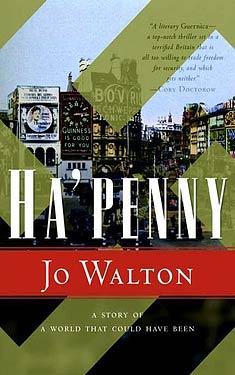Jo Walton
Completed 6/26/2020,
Reviewed 6/26/2020
4 stars
This is another
amazing book in the Small Change trilogy.
Like it’s predecessor Farthing, it’s a mystery set in an alternative
England where it is allied with the victorious Nazis in 1949. This one didn’t have me as enthralled as the
first book. I thought the pacing was a
little slow in the middle, but it’s still a mostly riveting read. Where this book really excelled was in the
characterization. I thought Viola Lark,
one of the two narrators, was brilliantly depicted. I think I also really liked it because it was
about theater people, and I love the theater.
This book was nominated for multiple awards, including the Gaylactic
Spectrum Award in 2008, and won the Prometheus Award the same year.
 The book
starts out shortly after the end of the previous one. An actress and another person are killed when
a bomb goes off in her house. It’s quickly
established that bomb was being assembled there and went off accidently. Scotland Yard Investigator Peter Carmichael
is once again called in to investigate.
It turns out the actress was supposed to be in a new production of
Hamlet in London. The story also follows
Viola, who is tapped to play Hamlet in the same gender-bending production. It turns out Viola has a familial connection
to this bombing. In addition, Hitler,
Himmler, and the new fascist prime minister Normanby are scheduled to attend
the opening night. Carmichael can see
what’s going on, but it is up to him to get the evidence and put the pieces
together before the deadly night.
The book
starts out shortly after the end of the previous one. An actress and another person are killed when
a bomb goes off in her house. It’s quickly
established that bomb was being assembled there and went off accidently. Scotland Yard Investigator Peter Carmichael
is once again called in to investigate.
It turns out the actress was supposed to be in a new production of
Hamlet in London. The story also follows
Viola, who is tapped to play Hamlet in the same gender-bending production. It turns out Viola has a familial connection
to this bombing. In addition, Hitler,
Himmler, and the new fascist prime minister Normanby are scheduled to attend
the opening night. Carmichael can see
what’s going on, but it is up to him to get the evidence and put the pieces
together before the deadly night.
The story is
once again told through two narratives, Viola’s and Carmichael’s. In Viola’s first-person narrative, she tells
the story of how she came to find out the connections her family has to the bombings
and to Hitler, as well as the progression of the play. With Carmichael, we get another third-person police
procedural, but this time, there’s more emphasis on his personal relationship
with his partner, who poses as his manservant to try to obfuscate their gay
identities. Both narratives are told
extremely well, although, as I mentioned above, I thought it got a little slow
in the middle, particularly in Viola’s story.
However, her transformation from politically ignorant to awareness is what
kept me going through that part.
Carmichael
is also really well developed as he copes with the despair and hopelessness
from the last case and the hopelessness of being gay in a country that is becoming
more fascist. There’s more interaction
with his partner Jack, though he spends so much time on the case, we don’t get
to see as much of Jack as I’d like.
The book is
still terrifying in its depiction of a world where Jews, homosexuals, and other
undesirables are made scapegoats and are brutally treated. There’s even a law which suspends constitutionally
guaranteed rights in order to round up people without trial. Jews are sent back to continental Europe,
which is completely occupied by the Nazis, because “they know how to take care
of them there.” It’s all very chilling
and poignant given what’s going on in the USA today.
I give this
book four stars out of five, that’s one less star than its predecessor, because
of the lost pacing in the middle. But
other than that, it’s a fine book with terrific prose and realistic dialogue. I’m going to take a break again and read
another book before getting to the last entry in the trilogy, mostly to chill
after the very suspenseful, thought-provoking ending.
No comments:
Post a Comment